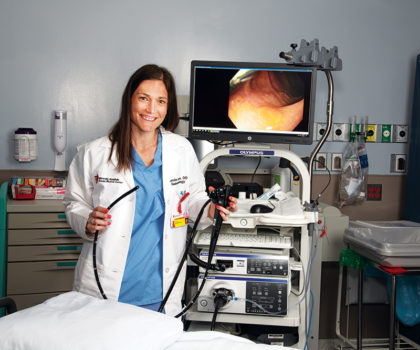At University Hospitals Geauga Medical Center, colonoscopies have never been easier

By Ken McEntee
Colorectal cancer is the second most common cause of cancer death among Americans.
That’s the bad news.
The good news is that colorectal cancer, if diagnosed early enough, is one of the most treatable types of cancer, says Caroline Soyka, D.O., a gastroenterologist at University Hospitals Geauga Medical Center. That, she says, is why the American Cancer Society and other organizations now recommend a colorectal cancer screening at the age of 45—or earlier for people with a history of colorectal cancer in their families.
Previously, screening guidelines suggested a screening at the age of 50 for average risk patients.
“Colorectal cancer has been increasing in the 40- to 50-year-old population,” Dr. Soyka says. “Getting screened earlier is resulting in additional life years after diagnosis.”
There are several screening options, but a colonoscopy, Dr. Soyka says, is the gold standard for detecting cancer. More importantly, she says, the procedure also helps to prevent cancer by removing polyps that could develop into cancer. During a colonoscopy, the doctor examines the inside of a patient’s colon using a small camera at the end of a flexible tube. At the same time, any polyps—or abnormal growths—can be snipped and removed for testing. The procedure usually takes about a half hour.
Almost half of the patients who get colonoscopies have one or more polyps removed, Dr. Soyka says. However, she assures, about 99 percent of them are not cancerous.
The thought of having a tube inserted into your rectum and colon may sound uncomfortable, which may be why many people choose not to get screened. However, Dr. Soyka says, patients are typically sedated during the procedure and feel little discomfort.
“At UH Geauga Medical Center, we take extra steps to make colonoscopies more comfortable and safe for our patients,” she emphasizes. “Traditionally, the colon has been inflated with air during the procedure. Instead, we use water immersion, which lets the scope swim through the colon more comfortably, and carbon dioxide, which is more easily absorbed by the lining of the colon and reduces the risk of perforation.”
Most people, Dr. Soyka adds, find the preparation prior to the colonoscopy to be the worst part of the process.
To get the best view, the colon needs to be completely cleaned out. That is typically done by drinking a laxative that will keep the patient in the bathroom for a long time. Today, Dr. Soyka says, solutions are available that are less unpleasant than the traditional gallon of polyethylene glycol.
“Bowel prep is better than it used to be,” she says. “One option requires only 16 ounces of fluid. Another prep can be done a half-hour before going to sleep, and finished the next morning. Generally, the least unpleasant options cost less.”
Patients whose colonoscopies reveal no polyps are usually advised to have another screening done in 10 years. If polyps are found, the patient will be advised to have another colonoscopy done in five years or less.
For some patients, less invasive stool-based cancer screening may be an alternative to a colonoscopy. But Dr. Soyka suggests talking to your doctor or a gastroenterologist before compromising accuracy for convenience.
“Stool tests detect abnormal DNA cells, but they don’t let you physically see—and remove—polyps that are in a patient’s colon,” she cautions. “They don’t offer the preventative aspect that makes colonoscopies the gold standard for colorectal cancer detection.”
You can schedule a colonoscopy or find out more by visiting UHhospitals.org/Geauga, or by calling 440-901-1009. University Hospitals Geauga Medical Center is located at 13207 Ravenna Road, in Chardon.
